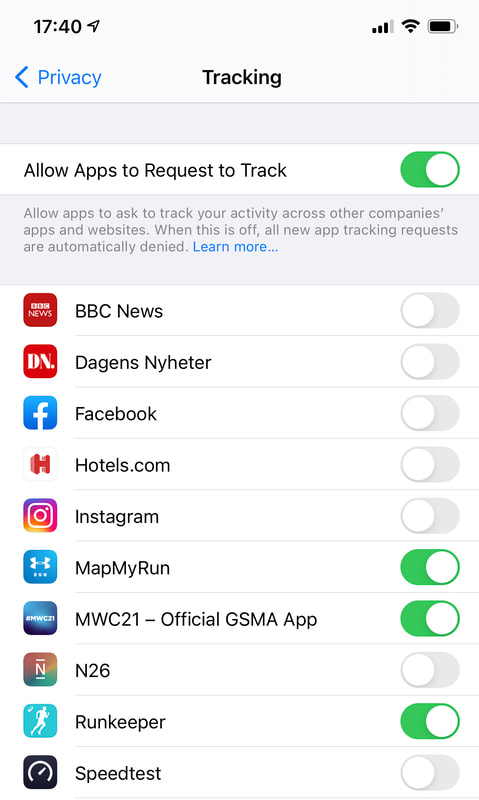|
We are all probably skeptical about people who tell us what we should do because they think it’s what is best for us. A good example is adults telling kids and teenagers what to do and not to do to protect them. Apple and Google are doing something similar with privacy. They want to be consumers’ parent to protect their privacy, but they want to keep control. Do consumers really want this, or would they like to control what to do with and where to use their own data? Here lies an opportunity for a new data business.
Apple is introducing new models in the latest iOS versions for users to control the trackers of mobile apps. Basically, a user must allow apps to follow them around the web, collect data and target other apps. Not surprisingly, there are estimates that around 70% of people, if asked, would not allow tracking of this type so that Apple may be onto something. However, this also increases Apple’s control of the ecosystem and makes it even more a closed-garden system by giving Apple control over what app vendors can do and how they do it. This would have an impact on other companies like Facebook and Tencent, which operate online advertising. Facebook has already warned, this would affect its revenue. Tencent and other Chinese mobile internet companies have developed workarounds for the model. Google’s Chrome will shortly stop supporting third-party cookies, making it harder to track users on the web. Simultaneously, Google is preparing new solutions to track the browsing history and profile and segment users, enabling advertisers to target ads better. This is coming from Google’s Privacy Sandbox project and gives Google a more critical role in the advertising ecosystem, making it harder for smaller ad companies and advertisers to work independently. Privacy and user tracking resemble something from the ‘wild west’. It becomes more complex when a few companies can control a significant part of the internet and mobile ecosystems. This may be specifically about web tracking and ad targeting, but Apple’s Health app collects data from wearable apps and enables downloading of health records, and Google Fit aims to do the same. All this opens the opportunity for a new unholy alliance between consumers and enterprises. Consumers could share their profiles direct with businesses and bypass the internet companies if they could see concrete benefits. This is not a new idea, but it needs easy solutions to become a reality. It is unlikely consumers will do something just for better privacy; they will want to see those benefits quickly. Let’s take a few examples of what this business and consumer cooperation could mean:
These are a few examples of how users can have a direct data relationship without the internet and mobile giants trying to control it. But consumers will need tools to collect their data and share profiles (not raw data). It can’t be something each individual negotiates with enterprises who would dominate, and consumers wouldn’t know the right price to demand. Consumers need weapons (i.e. tools and models) to do this properly. Ideally, this would be an open ecosystem with open source tools, open APIs in an open environment where different parties and developers could provide the means for consumers to keep their data. All this opens the door to new technology and companies to offer solutions for consumers and enterprises. Could this be the most significant change in the data business since the early days of the internet? Regulators could also accelerate this development by introducing new privacy rules, giving more power to consumers to control their data and restricting the internet giants’ dominating market position. Current privacy and data discussions and developments can confusing. Even though parties exist that want to protect consumers, they often add restrictions that make their lives more complex, particularly if they continuously need to click approvals. At the same time, data analytics offer more opportunities to consumers and businesses alike to better utilize data for better services, better prices, and make lives easier. The motives of some ‘protectors’ are not very clear and maybe not as ‘innocent’ or as ‘honorable’ as they might appear. There also lies the possibility of ‘data dominance’ simply moving from one actor to another. Long term solutions for data and privacy cannot be based on the controls and restrictions of a few big companies. Consumers must be able to control and utilize their data. All kinds of companies must also be able to use data if they can offer value to consumers. Otherwise, not only advertising but many other areas, including health and finance services, could also end up in the control of the internet giants. The article was first published on Disruptive.Asia. |
AboutEst. 2009 Grow VC Group is building truly global digital businesses. The focus is especially on digitization, data and fintech services. We have very hands-on approach to build businesses and we always want to make them global, scale-up and have the real entrepreneurial spirit. Download
Research Report 1/2018: Distributed Technologies - Changing Finance and the Internet Research Report 1/2017: Machines, Asia And Fintech: Rise of Globalization and Protectionism as a Consequence Fintech Hybrid Finance Whitepaper Fintech And Digital Finance Insight & Vision Whitepaper Learn More About Our Companies: Archives
January 2023
Categories |





 RSS Feed
RSS Feed
